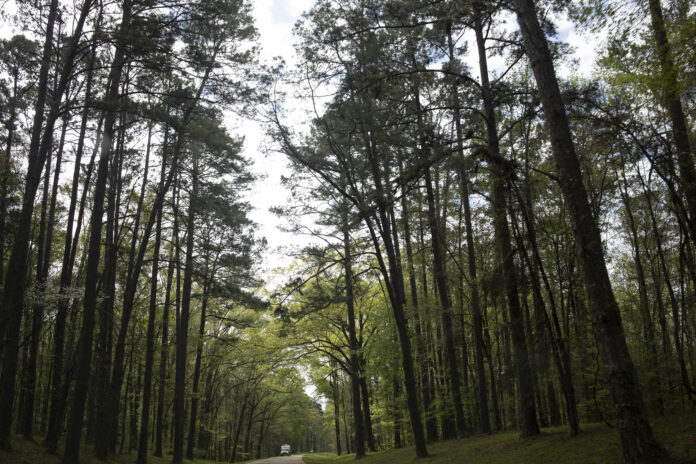I appreciate President Joe Biden’s environmental justice agenda and it gives me so much hope. He understands that low-income communities and communities of color have suffered worst and first from climate change and the burning of fossil fuels. He knows that the inevitable transition to a clean-energy economy presents a golden opportunity to make this right, and to ensure that all communities can thrive. And he has taken concrete actions that further this goal—from creating the first-ever White House Office of Environmental Justice, to establishing the Justice40 Initiative, which directs 40 percent of benefits from federal climate action to communities on the front lines of the climate crisis.
However, the president’s environmental agenda is missing an essential item: the expansion of commercial logging and wood pellet biomass mills cropping up in low-income, majority-Black communities across the South. Wood pellet factories are taking a terrible toll on exactly the kind of low-income communities of color that environmental justice is supposed to lift. So why does policy after policy—from last year’s Inflation Reduction Act and bipartisan infrastructure bill to the pending Farm Bill—include tax breaks, subsidies, and other incentives that are accelerating the wood-pellet plague’s rapid spread? Somehow, this injustice to communities across the South doesn’t seem to be on the Biden administration’s radar.
Look, President Biden: The wood pellet biomass industry is harming low-income, rural Black communities throughout the South. Please stop treating it like it’s good for people or the planet.
The biomass industry has been selling wood pellets as a clean, climate-friendly energy source. But the truth is that extracting wood from Southern U.S. forests, grinding it into dust, forming dust into pellets, shipping the pellets across the Atlantic, and burning it to produce electricity results in more greenhouse gas emissions than coal does.
Then there are the rural communities who suddenly find themselves living with a wood pellet factory in their midst. In my state of Mississippi, a wood pellet plant is located in Gloster—population about 900. The residents are majority Black, and the median income is $15,000 per year. People living in Gloster tell me that their once quiet town now must deal with the noise of the wood-pellet factory running day and night, as well as truck traffic in and out. They say the air pollution keeps them from enjoying being outdoors like they used to. They talk about burning eyes, worsening respiratory issues, and wood dust everywhere.
Andrew Lichtenstein/Corbis via Getty Images
Our communities are being needlessly sacrificed for wood pellets shipped to countries in Europe, particularly the U.K., and now Asia. The clearing of the fires and the toxic manufacturing process would not be allowed in the U.K. and members of the British Parliament can’t understand why our government is allowing this in our country.
In 2020, the Mississippi Department of Environmental Quality fined Drax Group, the plant’s U.K.-based owner, $2.5 million for exceeding its permitted air pollution limits. This spring, the department issued another notice of violation for exceeding air pollution limits—this time for emitting more than 25 tons of hazardous air pollutants per year.
There are now 23 wood pellet mills across the South, from Texas to Virginia. At least a dozen more are in the planning stages. Taxpayers are helping pay to build many of these factories. One plant in Lucedale, Miss. Is receiving up to $17 million in taxpayer-funded grants, incentives, and tax breaks. This is in addition to the billions of dollars of subsidies the U.K. gives these industries. Meanwhile, over a million acres of U.S. forest have already been cut to supply the biomass industry, releasing millions of tons of carbon dioxide.
The wood pellet biomass industry doesn’t fit with the “whole of government” environmental justice agenda that President Biden talks about—an agenda that his administration is working to achieve in so many other arenas. The big international companies in the wood-pellet energy business are exposing vulnerable communities to dangerous air pollution. They are contributing to climate change—both when wood is turned into pellets, and when the pellets are burned to generate power.
Rural southerners are losing our beautiful forests, which have provided everything from clean air and recreation to protection from climate impacts like flooding and extreme heat. If environmental justice means anything, surely it means protecting under-resourced Black communities from the pollution and disruption of the wood pellet industry.
Please look, President Biden, at our Southern vision of environmental justice. We see our kids and grandkids breathing clean air that doesn’t make them sick. We see healthy forests, clean water, and thriving local economies built on sustainable foundations. The wood pellet industry simply doesn’t fit into that picture.
Katherine T. “Kathy” Egland is the chair of the NAACP Board’s Environmental and Climate Justice (ECJ) Committee, and the co-founder of the nonprofit Education, Economics, Environmental, Climate and Health Organization (EEECHO) in Gulfport, Miss.
The views expressed in this article are the writer’s own.


